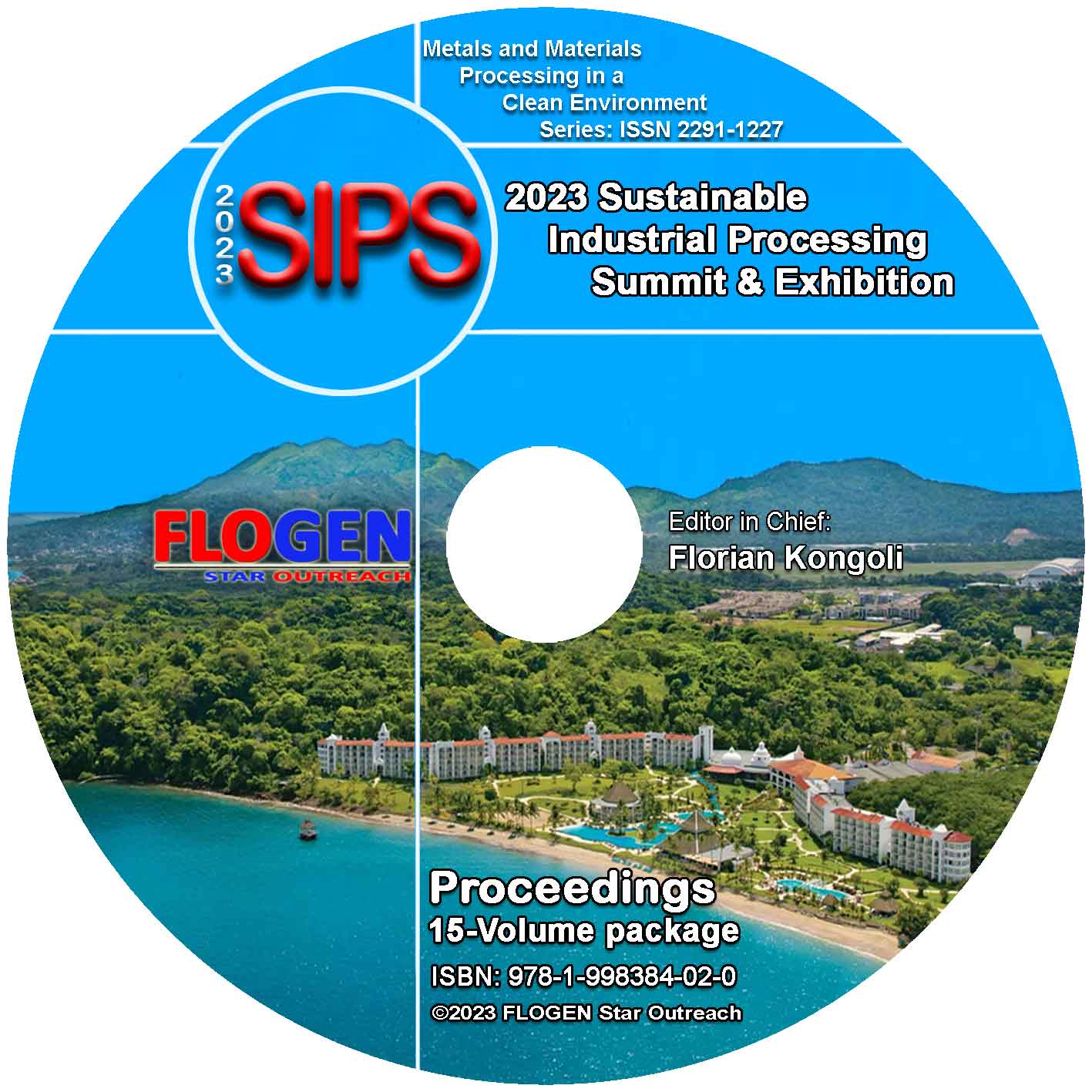2023-Sustainable Industrial Processing Summit
SIPS2023 Volume 14. Intl. Symp on Electrochemistry, Molten Salts, Corrosion and Recycling
| Editors: | F. Kongoli, R. Fehrmann, V. Papangelakis, I. Paspaliaris, G. Saevarsdottir, G. Kipouros, R. Singh, F. Wang, D. Macdonald, R. Gupta, M. Barinova, F. Ahmed, H. Ozgunay, K. Tang, N.N. Thanh, C. Gaidau, K. Kolomaznik |
| Publisher: | Flogen Star OUTREACH |
| Publication date: | 21 December 2023 |
| Pages: | 114 pages |
| ISBN: | 978-1-989820-98-8 (CD) |
| ISSN: | 2291-1227 (Metals and Materials Processing in a Clean Environment Series) |

CD shopping page
VOLATILITY OF SATURATED VAPOR COMPONENTS OF MOLTEN MIXTURES UCl4 –MCl (M - ALKALI METAL)
Alexei Potapov1; Alexander Salyulev1;1INSTITUTE OF HIGH TEMPERATURE ELECTROCHEMISTRY, Ekaterinburg, Russian Federation;
Type of Paper: Regular
Id Paper: 111
Topic: 13
Abstract:
The volatility of the components of molten mixtures of uranium tetrachloride with alkali metal chlorides UCl4-MCl (MCl = Cs, Rb, K, Na, Li and Na-K (1:1)), containing from 2 to 50 mol. % UCl4 were measured in the temperature range of 800-1200 K using the transpiration technique [1-3]. In vapors over molten UCl4–MCl mixtures, monomeric (MCl and UCl4) and dimeric (M2Cl2) molecules of alkali metal and uranium chlorides, as well as complex molecules of the MUCl5 type predominate.
The dissolution of UCl4 in molten alkali metal chlorides is accompanied by the complex formation, which manifests itself in a sharp decrease in the volatility of uranium tetrachloride and its content in saturated vapors. The strength of the complex chloride anions, formed in the melts (U3Cl142-, U2Cl102-, UCl62-, UCl73-), increases significantly as the concentration of UCl4 decreases; in a series of solvent salts from LiCl to CsCl and as temperature decrease. As a result, the volatility of UCl4 in the composition of all gaseous compounds over its solutions in ionic melts varies over a very wide range.
It has been established that at 973-1173 K the volatility of UCl4 in UCl4-LiCl melts decreases by about 330-260 times as the concentration of UCl4 in melts decreases from 50 to 2 mol. %. Under the same conditions, the volatility of UCl4 in UCl4–CsCl melts decreases by a factor of approximately 180,000–20,000. At lower temperatures, volatility decreases faster. An increase in the radius of cations in the series from Li+ to Cs+ reduces their counterpolarizing effect on chlorine anions, which are a part of the U(IV) chlorocomplex groups, which are strengthened in this case. Other things being equal (temperature and concentration), the complexes strengthening leads to a decrease in the volatility of UCl4 by 3700–340 from its dilute (2 mol.%) solutions and by a factor of 7–5 from concentrated (50 mol.%) ones in molten alkali metal chlorides at 973-1173 K.
It has been established that the dependence of the logarithm of the UCl4 volatility on the reciprocals of the effective ionic radii of alkali cations is almost linear. This makes it possible to estimate the volatility of uranium tetrachloride from its not yet studied solutions in molten mixtures of alkali metal chlorides, using the weighted average radius of monovalent cations as the effective ionic radius.
Keywords:
Chloride; Lithium; Mixtures; Moltensalt; Uranium; Vapor; Volatility; UCl4References:
[1] A.B. Salyulev, V.Ya. Kudyakov, N.I. Moskalenko, Russ. Metallurgy (Metally) 2021 (2021) 992-997.[2] A.B. Salyulev, V.Ya. Kudyakov, N.I. Moskalenko, Rasplavy (Melts), No 4 (2022) 338-349.
[3] A.B. Salyulev, V.Ya. Kudyakov, Rasplavy (Melts), No 2 (2023) 190-202. (In Russian)